Instructor: Dr. Natalia Tretyakova, Ph.D. «hyperlink
"mailto:[email protected]"»
- 6-3432
PDB reference
correction and design Dr.chem., Ph.D. Aris
Kaksis, Associate Prof.
mailto:[email protected]
Transcription
Transcription
Translation
 Translation
Translation
Protein
Synthesis Part 1: Take Home Message
Required reading: Stryer Ch.
34, p. 875-888 Ch.
33 p. 849-850
1) Translation of the genetic code is dependent
on three base words that correspond to a single
amino
acid AA (codons).
2) The mRNA message is read by tRNA through the
use of a three base complement to the three 3
base
word (anticodon).
3) A
specific amino
acid AA is conjugated to a specific tRNA.
4) Amino
acid AA side chain size, hydrophobicity
and polarity
govern the ability of tRNA synthetases
to
conjugate a specific three 3 base message with a
specific
amino acid AA.
Table 1. The genetic code. for mRNA Y Genetic
Code
| 1st position |
2nd position |
3rd position
|
| (5' end)--> |
 |
C |
A |
G |
(3' end)-->
|
 |
Phe
Phe
Leu
Leu |
Ser
Ser
Ser
Ser |
Tyr
Tyr
STOP
STOP |
Cys
Cys
STOP SelenoCys Trp Mitochondria
Trp |

C
A
G |
| C |
Leu
Leu
Leu
Leu |
Pro
Pro
Pro
Pro |
His
His
Gln
Gln |
Arg
Arg
Arg
Arg |

C
A
G |
| A |
Ile
Ile
Ile
Met init |
Thr
Thr
Thr
Thr |
Asn
Asn
Lys
Lys |
Ser
Ser
Arg
Arg |

C
A
G |
| G |
Val
Val
Val
Val |
Ala
Ala
Ala
Ala |
Asp
Asp
Glu
Glu |
Gly
Gly
Gly
Gly |

C
A
G |
Sets of three 3
nucleotides (codons) in an mRNA
molecule are translated into amino
acids AA in the course of protein
synthesis according to the rules shown. The codons G G and GAG, for example, are translated into valine and glutamic acid, respectively.
Note that those codons with
G and GAG, for example, are translated into valine and glutamic acid, respectively.
Note that those codons with  or C
as the
second 2 nucleotide tend to
specify the more hydrophobic amino
acids AA.
or C
as the
second 2 nucleotide tend to
specify the more hydrophobic amino
acids AA.
Structure of Transfer RNA

Di-hydro-uridine (DHU) Anti Codon
Pseudo-uridine (Y)
Classes of
Aminoacyl-tRNA Synthetases
• Class I: Arg,
Cys, Gln, Glu, Ile, Leu, Met, Trp, Tyr, Val
(Generally the Larger Amino Acids)
• Class II: Ala,
Asn, Asp, Gly, His , Lys, Phe, Ser, Pro, Thr
(Generally the smaller amino acids)
Charged
tRNA -76
tRNA
Activation by aminoacyl tRNA synthases
1. Amino-acyl-AMP
formation


2.
Aminoacyl transfer to the appropriate tRNA
+ AMP1-


tRNA Recognition
by Synthetases
• Specific recognition of
the anticodon; ex. an change
the anticodon for tRNATrp to
that
for methionine and get good acylation
by tRNAMet.
•Stem sequences can be crucial;
ex. tRNAAla depends
on GC
at position 3:70 doesn't care what the
codon is.
• Both the stem regions and anticodon are needed; ex.
tRNA Gln.
tRNA
Recognition by Synthetases
tRNA-Ala
tRNA-Phe
Trna-
Ser

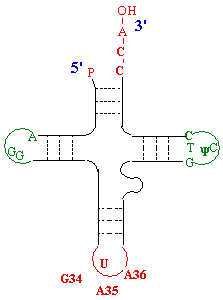

tRNA
Recognition by Synthetases


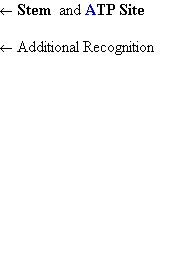
Anticodon Recognition
tRNA Synthetase Proofreading
Ile
Large Smaller Large
Smaller
Acylation Site Hydrolytic
Site
Acylation Site Hydrolytic
Site
 <--
Difference --
<--
Difference -- 


Correct Acylation
Mis-acylation
tRNA
Synthetase Proofreading Val
Hydrophobic
Polar
Hydrophobic
Polar
Acylation Site Hydrolytic
Site
Acylation Site Hydrolytic Site
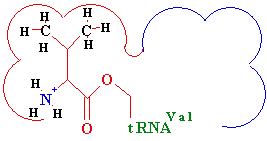 ¬
Difference ®
¬
Difference ®



Correct Acylation
Mis-acylation
How do we go from mRNA to
Protein?

Incoming tRNA
Table 1. The genetic code.
for mRNA Y
Genetic
Code
| 1st position |
2nd position |
3rd position
|
| (5' end)--> |
 |
C |
A |
G |
(3' end)-->
|
 |
Phe
Phe
Leu
Leu |
Ser
Ser
Ser
Ser |
Tyr
Tyr
STOP
STOP |
Cys
Cys
STOP SelenoCys Trp Mitochondria
Trp |

C
A
G |
| C |
Leu
Leu
Leu
Leu |
Pro
Pro
Pro
Pro |
His
His
Gln
Gln |
Arg
Arg
Arg
Arg |

C
A
G |
| A |
Ile
Ile
Ile
Met init |
Thr
Thr
Thr
Thr |
Asn
Asn
Lys
Lys |
Ser
Ser
Arg
Arg |

C
A
G |
| G |
Val
Val
Val
Val |
Ala
Ala
Ala
Ala |
Asp
Asp
Glu
Glu |
Gly
Gly
Gly
Gly |

C
A
G |
Sets of three 3
nucleotides (codons) in an mRNA
molecule are translated into amino
acids AA in the course of protein
synthesis according to the rules shown. The codons G G and GAG, for example, are translated into valine and glutamic acid, respectively.
Note that those codons with
G and GAG, for example, are translated into valine and glutamic acid, respectively.
Note that those codons with  or C
as the
second 2 nucleotide tend to
specify the more hydrophobic amino
acids AA.
or C
as the
second 2 nucleotide tend to
specify the more hydrophobic amino
acids AA.
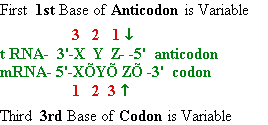

Wobble
pairing rules
5’ anticodon base
3’ codon
base
C
G
A

 A or G
A or G
G
C or 
I
 , C, or A
, C, or A
tRNA
Anticodon-Codon Recognition
Anticodon 3’ – C – G – I – 5’
3’ – C – G – I – 5’
3’ – C – G – I – 5’
Codon 5’ – C – G –  – 3’
5’ – C – G – C – 3’
5’ – C – G – A – 3’
– 3’
5’ – C – G – C – 3’
5’ – C – G – A – 3’
Anticodon 3’ – C – G – G – 5’
3’ – C – G – G – 5’
Codon 5’ – C – G –  – 3’
5’ – C – G – C – 3’
– 3’
5’ – C – G – C – 3’
Anticodon 3’ – C – G –  – 5’
3’ – C – G –
– 5’
3’ – C – G –  – 5’
– 5’
Codon 5’ – C – G – A – 3’
5’ – C – G – G – 3’
Anticodon 3’ – C – G – C – 5’
3’ – C – G – A – 5’
Codon 5’ – C – G – G – 3’
5’ – C – G –  – 3’
– 3’
tRNA Anticodon-Codon
Recognition
Adenosine
Inosine
Guanosine
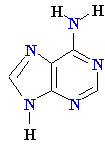


Anticodon
3’ – C – G – I – 5’
3’ – C – G – I – 5’
3’ –
C – G – I – 5’
Codon 5’ – C – G – C – 3’
5’ – C – G – A – 3’
5’ – C – G –  – 3’
– 3’



I------C base pair
I-----A base
pair
I----- base
pair
base
pair
Nonsense suppression


Table 1. The genetic code. for mRNA Y
Genetic Code
| 1st position |
2nd position |
3rd position
|
| (5' end)--> |
 |
C |
A |
G |
(3' end)-->
|
 |
Phe
Phe
Leu
Leu |
Ser
Ser
Ser
Ser |
Tyr
Tyr
STOP
STOP |
Cys
Cys
STOP SelenoCys Trp Mitochondria
Trp |

C
A
G |
| C |
Leu
Leu
Leu
Leu |
Pro
Pro
Pro
Pro |
His
His
Gln
Gln |
Arg
Arg
Arg
Arg |

C
A
G |
| A |
Ile
Ile
Ile
Met init |
Thr
Thr
Thr
Thr |
Asn
Asn
Lys
Lys |
Ser
Ser
Arg
Arg |

C
A
G |
| G |
Val
Val
Val
Val |
Ala
Ala
Ala
Ala |
Asp
Asp
Glu
Glu |
Gly
Gly
Gly
Gly |

C
A
G |
Sets of three 3
nucleotides (codons) in an mRNA
molecule are translated into amino
acids AA in the course of protein
synthesis according to the rules shown. The codons G G and GAG, for example, are translated into valine and glutamic acid, respectively.
Note that those codons with
G and GAG, for example, are translated into valine and glutamic acid, respectively.
Note that those codons with  or C
as the
second 2 nucleotide tend to
specify the more hydrophobic amino
acids AA.
or C
as the
second 2 nucleotide tend to
specify the more hydrophobic amino
acids AA.
Protein Synthesis Part 2:
Take Home Message
1)
Translation always
proceeds by reading the mRNA sequence from the 5’ to the 3’ end.
2)
Amino acids are assembled in to proteins with the first amino acid
having a free amino group
—NH3+ (N-terminus)
and the last having a
free carboxylate—COO— (C-terminus).
3) Synthesis of the protein is processive and contains
steps;
a)
initiation, b) elongation and c) termination
Overall Ribosome Structure:
Translation
Machine





• tRNA site, peptidyl
transferase, GTPase
and Exit site
DNA
5'-ATG---GCC-

 --GA
--GA --
-- C
C -AAA--
-AAA-- AA- 3’
Translating the
Message
AA- 3’
Translating the
Message
RNA 5' -A G--GCC-
G--GCC-

 --GA
--GA --
-- C
C -AAA--
-AAA-- AA--3’
AA--3’
Protein N- Met Ala
Phe Asp Ser
Lys Stop
-C Overview of
Translation
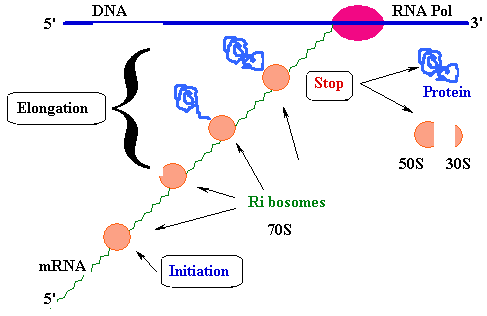

1) Translation of the genetic code
is dependent
on three base words
that
correspond to a single amino acid.
2) The mRNA message is read by tRNA through the
use of a three base complement to
the
three 3 base word.
3) A specific amino acid is conjugated to a
specific tRNA (three base word).
4) Amino acid side chain size, hydrophobicity and polarity govern the ability of tRNA synthetases to
conjugate
a specific three base message with a specific amino acid AA.
 Translation
Translation



































